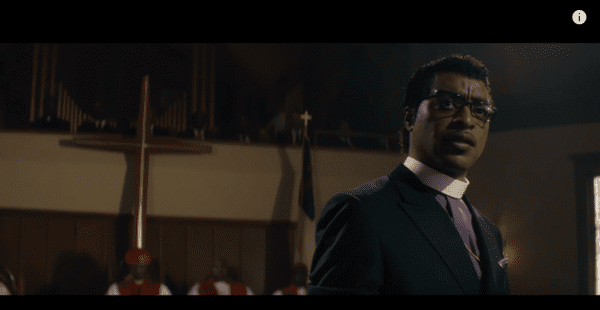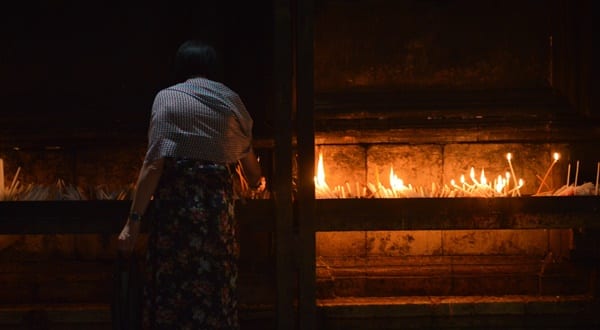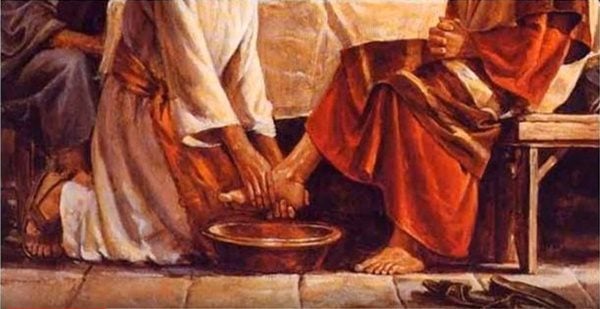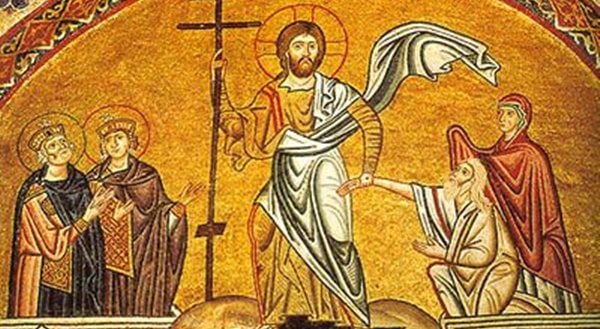The opening sequence of the Netflix biopix Come Sunday follows Bishop Carlton Pearson (Chiwetel Ejiofor) from a triumphant preaching engagement onto a plane flight where, despite his weariness, he works to convert his once Catholic seatmate. Why? Because as an Evangelical, he is dutybound to convert the unsaved, preventing them from going to hell. The strength of this belief had empowered Pearson to ascend from the storefront churches of his youth to the mentorship of Oral Roberts, to his own 5,000 person racially diverse Higher Dimensions congregation in Tulsa, Oklahoma.
Then, he experiences his own conversion.
While deeply troubled by a news report about people suffering during the 1994 Rwandan genocide, people his beliefs declared were doomed to hell, he received a message from God stating all people are saved. Sharing this message with church members led to his life unraveling – he loses his congregation, must sell his worship center, and is branded a heretic.
If no one goes to hell, wouldn’t people in Pearson’s congregation experience a new level of freedom and divine love? Unfortunately, that is not how human beings work. How humans know they are “good” is by separating themselves from people they know to be “bad.” Up till his conversion Pearson had preached a comforting message to his congregation, that they had already been saved from hell. Only the unsaved, the unrepentant, were condemned. As Catholic theologian James Alison explains in this interview with Raven Foundation Founder Suzanne Ross, “… think how much investment in our culture and society there is in being the good guy, and how much talk there is about morality, as though people can put a boundary around themselves as ‘good.’ This then has real value in any form of public engagement.” Pearson’s declaration stripped from his congregation the critical boundary of goodness. If everyone was saved, their goodness had been robbed of meaning.
The film illustrates the cost of Pearson’s new belief to him and his family; it also displays the pain inflicted on people labeled “unsaved”:
- Pearson’s refusal to assist his aged, incarcerated Uncle Quincy (Danny Glover) by writing a letter to the parole board;
- Pearson telling the congregation’s closeted gay music director Reggie (Lakeith Stanfield) it was okay to be gay as long as he didn’t “live gay”;
- Televangelist and Pearson mentor Oral Roberts (Martin Sheen) sadly, but firmly, stating his gay son Ronnie, who committed suicide, was in hell.
Pearson’s path to recovery is supported by his wife, Gina (Condola Rashad), whose shift from handmaiden to First Lady is brilliantly depicted. As he moves forward, Pearson’s view of salvation expands, leading him to repent of his harshness to his uncle and Reggie. The closing scene bookends the opening with Pearson preaching to the ultra-diverse City of Refuge congregation in Oakland. There he acknowledges he would never have encountered a group like them without this life change. In closing he ponders, “What is so hard about unconditional love?”
[tweetthis]“What is so hard about unconditional love?” – Carlton Pearson[/tweetthis]
Carlton Pearson’s story was first related in 2005 in the “Heretics” episode of This American Life. This American Life host, Ira Glass, acted as one of the producers for the film. In the viewing I attended, Glass led a post-show discussion which included Carlton Pearson, his wife Gina Pearson, and film director Joshua Marston. During the Q&A session, Pearson explained he has moved beyond universalism (brilliantly explained in Kevin Miller’s Raven Award winning documentary Hellbound?) to Metacostalism, focused on expanded consciousness, where he no longer considers Jesus divine, but a brother. On that note, I wholeheartedly agree with Peter Laarman’s statement in his Religion Dispatches article, “Personally, I wish that the impressively gifted Pearson could have stuck it out and fought the good fight within a Christianity that desperately needs to ‘go and learn what this means: “I desire mercy, not sacrifice”‘ (Mt. 9:13 – Jesus quoting Hosea)”.
As a practicing Catholic, viewed by Evangelicals as one of the unsaved, I left the theater wondering whatever happened to that unconditional love.
Image: Screenshot from Youtube: “Come Sunday | A Netflix Original Film | Netflix”












